Cost of Deck Installation: How Much Does It Really Cost?
By Dave KileWhether you have finally found your forever home or are planning to sell, installing a deck is a worthwhile home renovation. A garden deck enhances outdoor living space—making it more useable, welcoming, and aesthetically pleasing. Plus, it can add quite a bit of value to your home.
While the exact value a deck adds depends on many factors such as size, materials, and design, home realtors say it adds anywhere from 5% to 10% to your home’s value. Bundled with outdoor remodelling projects like landscaping and other exterior home renovations, this increase soars even higher—up to 20%.
However, even with proven returns, no home improvement project is one size fits all—only you can decide if a new deck is the right investment. That’s why below, we break down everything you need to know to make an informed choice. In addition, we cover how much a new deck costs, decking material options (and prices), maintenance considerations, and much more!
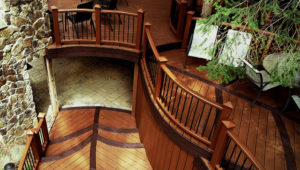 Average Deck Cost Per Metre
Average Deck Cost Per Metre
The average cost to build a deck is £5 – £20 per metre (for decking materials only—it does not include installation costs).
Choosing softwood decking like spruce or cedar can drop your cost to as low as £3 per meter. Contrastingly, high-quality hardwood like ipe or composite decking can cost upwards of £20 per meter.
Keep in mind the average cost above is per one-meter length board—not a square meter. Square meter cost will vary depending on board width. Keep scrolling to see a breakdown of the cost per square meter for various materials.
Average Cost to Build a Deck by Size
The average cost for garden decking is £1,500, according to MyJobQuote. However, this price can significantly increase or decrease depending on deck materials, style of deck, labour, add-ons, and—perhaps most tellingly—size of the deck.
Here is what to keep in mind when looking at prices for the deck sizes below:
Labour: The costs include a labour estimation, but this can drastically range depending on where you live.
Cost: A range for cost has been included since deck materials broadly impact price. Opting for more economical decking like softwood will bring you closer to the lower end. More luxurious deck materials like hardwoods and composite decking are at the higher end. Additionally, unique deck shapes, such as those with rounded edges, will cost more than square decks or rectangular decks.
| Deck Size | Average Cost Range |
| 15 square metres | £800 – £2,560 |
| 30 square metres | £1,200 – £4,720 |
| 60 square metres | £1,600 – £6,880 |
| 90 square metres | £2,000 – £9,040 |
Labour Cost to Build a Deck
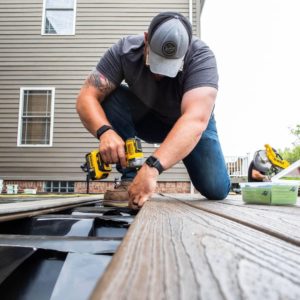 The average labour cost to build a deck is £20 – £50 per square metre. Deck materials that are lighter and easier to install, like softwoods, are cheaper. On the other end of the spectrum, heavy hardwoods like redwood and premium materials like composite will cost more.
The average labour cost to build a deck is £20 – £50 per square metre. Deck materials that are lighter and easier to install, like softwoods, are cheaper. On the other end of the spectrum, heavy hardwoods like redwood and premium materials like composite will cost more.
The best way to know what to expect for labour costs is to talk to neighbours with a deck installed within the past year. Alternatively, you can also find a contractor for a quote or get an estimate from a website like Price Your Job.
Material Costs for Deck Building
There are more decking material options available in today’s market than ever. The most common are composite, wood, PVC, and aluminium.
Composite Decking Cost
£80 – £200 per square metre (materials only)
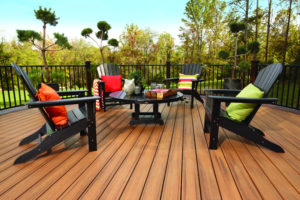 This type of decking is made from a mix of wood, plastic, and bonding agents to give it the aesthetic of wood but with enhanced durability. It never splinters or rots, comes in various colours and requires very little maintenance—mainly just a semi-annual deck cleaning.
This type of decking is made from a mix of wood, plastic, and bonding agents to give it the aesthetic of wood but with enhanced durability. It never splinters or rots, comes in various colours and requires very little maintenance—mainly just a semi-annual deck cleaning.
Composite materials are more expensive than other options. However, something to consider is that it also tends to last longer—30 to 50 years—which can save you repair and replacement costs down the road (deck repairs tend to cost around £150 to £400). Additionally, many companies that offer this decking also provide a warranty. For example, Trex offers a 25-year warranty, while many other companies also give 10 – 25 years.
Wood Decking Cost
£15 – £100 per square metre (materials only)
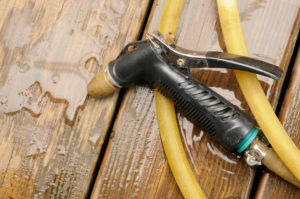
Natural wood decks are a classic that naturally blends with most home exteriors and can be stained or painted in any colour. However, most wood types will need regular maintenance to keep them looking their best. This includes cleaning, sanding, oiling, and re-staining.
Wood decking includes softwoods like cedar and pine and hardwoods like teak and Brazilian walnut (ipe). Cost varies depending on the type of wood—softwood is cheaper than hardwood—as well as the thickness. For example, while a square metre of 19mm timber costs on average £35, 28mm timber costs more than double at £80.
Below are some of the most popular deck woods.
Pressure Treated Wood – A chemically treated wood to better withstand weathering, rot, and bug infestations. Regular maintenance is required, but it is a cheaper option.
Cedar – A popular choice for building decks due to its low price point, lower install price, and resistance to rot and termite damage. It is easy to work with but will need a fair bit of maintenance, including sanding, staining, and sealing.
Pine – Another popular softwood decking material. Pine is widely available and easy to stain but will need regular maintenance. In addition, it is not long-lasting, especially compared to hardwoods or composite.
Teak – Many early decks used this classic hardwood that is moisture resistant and sports a beautiful finish. However, it has fallen out of favour recently due to its high price and more decking material options than ever.
Iroko – An African hardwood that is heavy and dark with a rich oily finish and irregular grain. Great for wetter climates since it naturally repels bugs and moisture (to some degree) thanks to its natural oils and resins. Due to its slow-growing nature and being an imported wood, it is on the higher end of the price scale. Note that it also changes colour over time, much like teak does.
Redwood – A hardwood commonly used in decking due to its cheaper price point and that it doesn’t warp easily. Maintenance is an absolute must as this wood is susceptible to sun damage and rot without proper care.
Ipe – This high-end hardwood (pronounced ee-pay) is durable, heavy, and hard. It is one of the longest-lasting (and expensive) wood decking materials. In addition, its fire resistance is comparable to steel or concrete.
PVC Decking Cost
£30 – £80 per square metre (materials only)
This decking is all plastic and contains zero wood (unlike composite decking, which is a mix of resin and wood). It requires virtually no maintenance and is a more affordable decking material, but many types look cheap.
Aluminium Decking Cost
£40 – £90 per square metre (materials only)
This long-lasting decking material has an impressive lifespan of 60-100 years. It requires little maintenance and is highly resistant to bugs and rot. However, many find it less aesthetically pleasing than wood and composite alternatives. It is also worth noting that it has a very different underfoot feel.
Decking Prices and Deck Design
While size and type of material are major factors when determining decking prices, deck design also plays into the equation. Here are a few points to keep in mind:
- Unique deck shapes are more expensive than simple square or rectangular decks—especially if you opt for a design with rounded edges.
- A foot deck or ground-level deck is much more economical than a raised deck.
- Where the deck is going matters. A deck built on flat ground will always be a less expensive option compared to one that has to be engineered to accommodate uneven terrain.
Costs of Building a Deck Yourself vs Hiring a Professional
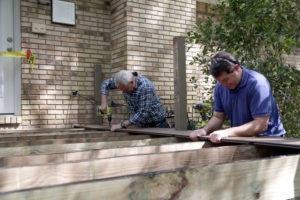 Undertaking a DIY deck project can save one-third to half of a decking project’s cost. The easiest decks (and most affordable) to build are ground decks since they have a simple design and don’t need posts, stairs, or railings. However, when it comes to more complex builds, such as second-story decks or floating decks, many homeowners feel it worthwhile to hire a deck builder or contractor.
Undertaking a DIY deck project can save one-third to half of a decking project’s cost. The easiest decks (and most affordable) to build are ground decks since they have a simple design and don’t need posts, stairs, or railings. However, when it comes to more complex builds, such as second-story decks or floating decks, many homeowners feel it worthwhile to hire a deck builder or contractor.
Pro Tip: Don’t forget the cost of tools! If you are thinking about a DIY job, ensure you have (or can borrow) all the tools required to get the job done. Tools are expensive and can easily cut into the money you saved by choosing DIY.
Additional Costs and Considerations
Materials – Deck boards are a primary factor when looking at decking material cost, but there are other building materials you need to consider. These include, but aren’t limited to, joists for your substructure (£6 – £15 each), posts (£30 -£60 each), balustrades (£19 – £150 each), weed membrane (£10 – £15 for a 215 square foot roll). Other items include screws, steps, deck railing, and deck stains.
Building a DIY deck? To make your new build last as long as possible, you should consider sealing joists and fasteners with butyl tape. Failing to do so may mean that the initial money saved on your DIY (plus some) gets spent a few years down the line to repair water damage.
Permits – Generally, decks that sit less than 30 cm off the ground don’t require planning permission (unless they take up more than 50% of garden space). However, it is always best to check with your local planning authority to see if you need any building permits or permissions, as these may cost extra. Additionally, you should be aware of building codes to avoid fines. For example, building regulations state that balustrading must be 90 cm high on the deck and 110 cm on deck steps.
Existing Deck – If you have an old deck that needs to be removed, a professional will charge extra to clear it—typically between £100 – £500 for a day. Want to do it yourself? You can hire a skip for £150 – £300, depending on the size you need.
Upkeep – Maintaining a deck comes with a cost, whether you hire help or DIY. A professional will charge £50 – £100 an hour, while a DIY job will cost you items like a stain, sealer, sanding paper—and your time. Therefore, it is best to carefully consider your decking materials before diving into your build. Cheaper materials tend to need more frequent maintenance.
Lifespan – An investment in hardwood decking or composite can save you money in the long run. This is because materials that are initially cheaper, like softwood, may cost more over time due to lifespan and maintenance.
Add-Ons – Don’t forget to factor in add-ons when calculating the total cost for your deck project. This may include a pergola, hot tub, built-in storage, or creative under-deck additions. Want to host unforgettable get-togethers? An outdoor kitchen may be just the ticket. Or, to fight off those chilly nights, every deck needs heaters or a fire pit.
How to Save Money When Building a Deck
Get Multiple Quotes: Get quotes from multiple deck builders before hiring to find the best price. Just be cautious of quotes that are too good to be true—always check a company’s reviews and references before making a final decision.
Keep it Simple: Simple deck designs will cost less than intricate ones. If you’re worried about it looking bland, remember that you can always decorate your deck and get creative with landscaping to give it flair and personality!
Build Off-Season: The best time to build a deck is between October and April. The cooler climate is better for laying down boards. Plus, your new deck will be ready to go for the summer months!
Do It Yourself: Cutting out labour can reduce the cost of building a deck by a third to half. If you can’t DIY the build, you can still save by demolishing and removing the old deck yourself.
Homeowners around the UK are enjoying their dream deck. And with a bit of budgeting and planning (and maybe a little elbow grease), you can be too! There is truly nothing like soaking up the sun on your own deck—just don’t forget the sunscreen!